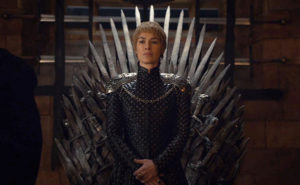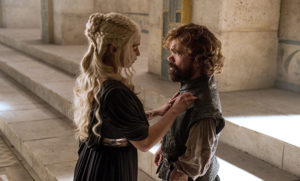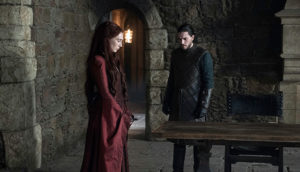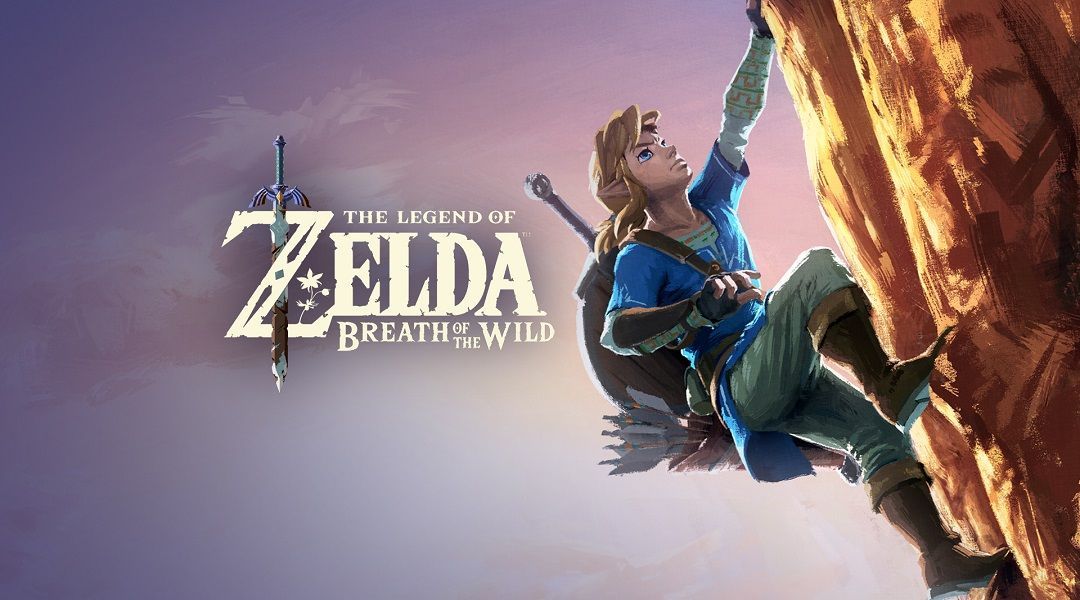 So with an explosion of highly destructive, wild green fire, winter finally makes its entrance to the world of Westeros. How does one simultaneously gasp with horror and breathe a sigh of relief? I don’t exactly know but I’m pretty sure I did just that this week. On the one hand, so many things have been resolved that were up in the air for nearly all of the show’s run, and even longer for book readers. On the other hand, a great many terrible things have happened, and in true Game of Thrones fashion, no one can stay happy for long.
So with an explosion of highly destructive, wild green fire, winter finally makes its entrance to the world of Westeros. How does one simultaneously gasp with horror and breathe a sigh of relief? I don’t exactly know but I’m pretty sure I did just that this week. On the one hand, so many things have been resolved that were up in the air for nearly all of the show’s run, and even longer for book readers. On the other hand, a great many terrible things have happened, and in true Game of Thrones fashion, no one can stay happy for long.
That’s how it goes, isn’t it? If you thought the finale to the best overall season this show has put out wouldn’t be all out crazy, well, then you would have been sensibly minded. After all, this is the first finale that’s really driven home what was promised for the season. If you’d have asked me if I thought Cersei would have gone through with the plan that was set up all season, and if we’d actually learn exactly who Jon Snow’s lineage was, and if Daenerys would finally start her journey to Westeros all in one episode, I would have emphatically answered, “no.” The fact that we got all that and more is pretty astounding.
I was most delighted and relieved by seeing all the big stuff get out of the way first. The extra long episode could have dragged out Cersei’s revenge until the end, but it was way more satisfying at the front. We were allowed to live with the aftermath, and lest we delight in her mass murder, we were forced to watch the most innocent victim of the entire ordeal jump out a window. The satisfaction on Cersei’s face at the moment of the explosion stood in stark contrast to the look of empty inevitability that she wore as she was crowned. She knows that while she may have gained the whole world, she lost her last son and her soul. A soulless Cersei is not one I would want to cross.
 The majority of these final turns in the season were the results of beliefs. Jon believing in honor and Sansa believing in him (and by extension, her family) brought the north back under the right hands for now. Arya’s belief in herself and her identity earned her some revenge. Tyrion’s very reluctant belief in Daenerys became the only belief that ever paid off for him. It also produced one of the best scenes in the history of the show. The redemption of Tyrion is my favorite thing that has ever happened on this series.
The majority of these final turns in the season were the results of beliefs. Jon believing in honor and Sansa believing in him (and by extension, her family) brought the north back under the right hands for now. Arya’s belief in herself and her identity earned her some revenge. Tyrion’s very reluctant belief in Daenerys became the only belief that ever paid off for him. It also produced one of the best scenes in the history of the show. The redemption of Tyrion is my favorite thing that has ever happened on this series.
If you dig a little deeper into these beliefs, however, you’ll notice that all of them have left some kind of destruction in their wake. Cersei’s destruction is clear. Arya is now a cold blooded killer. Daenerys and all who follow her are bringing what is sure to be a global war with them. Beliefs bring action. Sometimes that action can be peaceful inaction, but that’s rare in the seven kingdoms. The problem is, if all these beliefs require violence, someone has to pay for their beliefs. Not all of them can win the game in the end. Someone has to lose and someone has to die if this course is stayed.
That’s the great risk of belief. As sure as you may be in your belief, you run the risk of being wrong. Even as a Christian, though I hold as strong as I can my faith, technically I could be wrong. That’s not a comfortable thought to wrestle with, but it may be essential to strengthening our faith. Because in the name of the same belief system that I follow, many have done great wrongs. It’s important to question and reaffirm our faith. Melisandre is the perfect thematic example in this episode. As she admitted herself, she was wrong. How many died because she was wrong? Let’s also pause for a moment to recognize the heartbreaking brilliance of Liam Cunningham as Davos Seaworth in his confrontation scene with Melisandre this week. I believed every ounce of his agony.
Sansa: “Winter is here.”
Jon: “Well, father always promised, didn’t he?”
 All these beliefs and all the actions taken because of them, no matter how justified, have played out and we’re in no better of a place than where we started. The only thing that has proven true in the midst of it all is the promise of a father. How true that is in our own lives. Peter tells us at the beginning of 2 Peter that we have been granted the precious and very great promises of our heavenly Father. They are the only things that prove themselves true over and over. When it comes to your beliefs, the truth is you may be wrong, you may be right. But I don’t believe the gospel is about right and wrong. It is about the promises of the Father, and his promises have never failed and never will.
All these beliefs and all the actions taken because of them, no matter how justified, have played out and we’re in no better of a place than where we started. The only thing that has proven true in the midst of it all is the promise of a father. How true that is in our own lives. Peter tells us at the beginning of 2 Peter that we have been granted the precious and very great promises of our heavenly Father. They are the only things that prove themselves true over and over. When it comes to your beliefs, the truth is you may be wrong, you may be right. But I don’t believe the gospel is about right and wrong. It is about the promises of the Father, and his promises have never failed and never will.
As Tyrion reminds us, the great game is terrifying. In our own culture, the great game of politics can seem truly terrifying. Beliefs clash on grand stages and it often seems like no matter who wins, we all lose. For me, I’m going to lean on the promises of my Father. Much like we have discussed this season, the game of thrones is becoming less important to our main characters. You can see that in the emptiness of Cersei’s ascension. The personal journeys have overtaken the struggle, and we seem destined for unity rather than more division. Community has a power much greater than individual belief, and will last far longer than the reign of a king or queen. Winter may have come, but what lies ahead now is the promise of spring.


